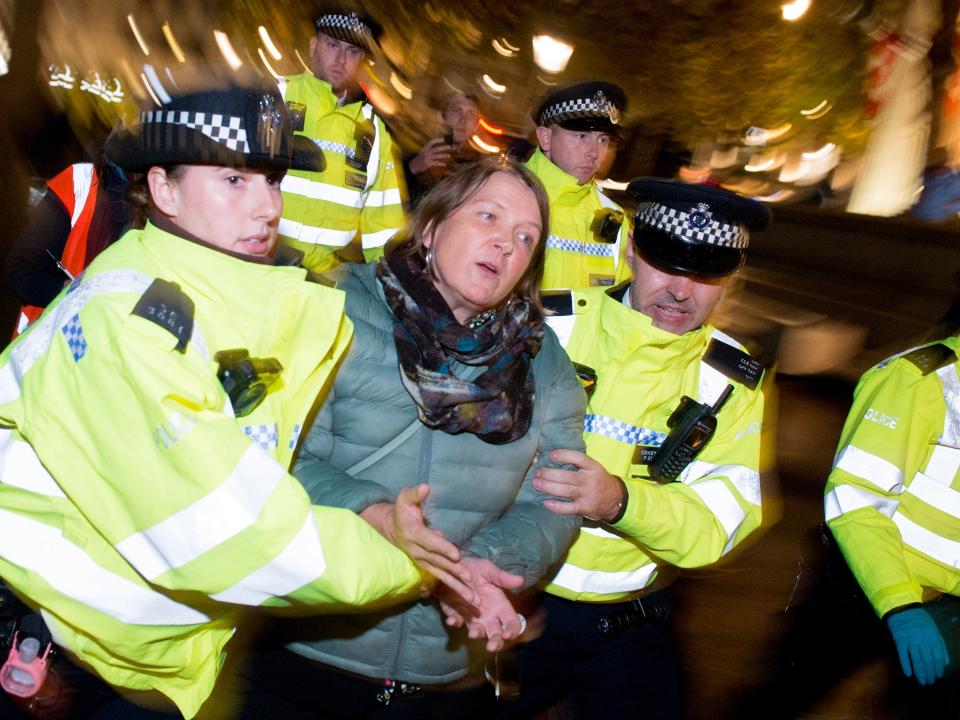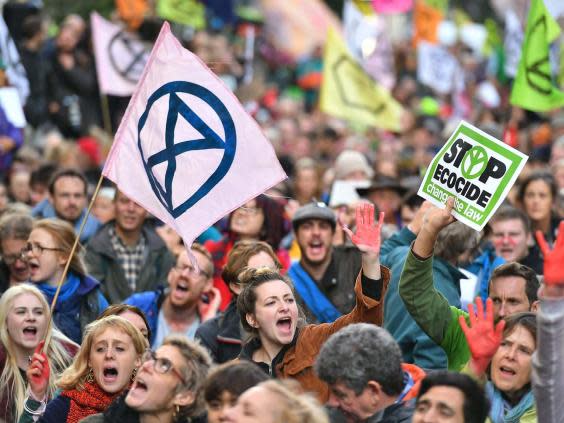Extinction Rebellion denies plan to collectively sue Scotland Yard after protest ban ruled unlawful

Extinction Rebellion say they are not planning to collectively sue the Met Police after the High Court ruled a ban on their protests was unlawful.
Instead the worldwide climate movement said that it would support people on an individual basis who may decide to seek compensation for false imprisonment.
The group estimate that around 300 protestors were unlawfully arrested during the blanket ban, which was imposed by police on 14 October.
It is thought an individual could be awarded up to £3,000 if they were to sue the police, and reports have claimed the group would make a concerted effort to claim as much as £1m in total.
However, representatives contacted by The Independent said there was no such co-ordinated action taking place, it would be left down to individuals as to whether action was taken.
They said that they would offer legal support to individuals, but would not be seeking compensation as an organisation.
Ellie Chowns MEP, who was one of seven XR supporters to bring the case to the High Court, was arrested by police in Trafalgar Square just hours after the ban was imposed.
She was arrested, handcuffed and taken to a police station where she was photographed, fingerprinted and put in a cell for several hours, before being released without charge at 3am on October 15.
Ms Chowns said she was one of those now taking legal advice on whether to pursue compensation.
“It was clearly ridiculous to arrest me for simply standing in Trafalgar Square, a pedestrianised public space,” she said.
“It set a very dangerous precedent, and if it hadn’t been challenged, would have had huge implications for our fundamental rights in our democracy.
“It would mean that the police would have a right to clear any peaceful protest that they choose. Many of our fundamental freedoms have been won through this means, so it’s vital that we protect the right to assemble.”
The Green Party MEP for the West Midlands said that she could see that suing the Met could really let the message “sink in”.
“It’s up to the individual whether they want to seek compensation, but there are clear arguments on both sides,” she added.
“Yesterday was essentially a rap on the knuckles for the police. They were told: ‘Don’t do that again.’ But I can see that taking it further might make the lesson really sink in.
“This is not about a problem with the police per se. Most officers act with grace and professionalism.
“It is about the fundamental principle of law, not about an individual grievance against the police.”
Tobias Garnett, an XR lawyer, told The Daily Telegraph that individuals who did decide to sue would be free to use the money to support other legal actions.
He said: “It vindicates our belief that the police’s blanket ban on our protests was an unprecedented and unlawful infringement on the right to protest.”
Mr Garnett added: “People who win damages are free to fund further protests but more likely we would urge them to pay the legal costs of those who cannot afford the various other court cases.”

Despite declining to fully endorse further legal action by anyone, Extinction Rebellion wrote on their Facebook page: “Suing [sic] is a good way to get some justice after being mistreated. That’s why we have laws.”
On Wednesday, Lord Justice Dingemans and Justice Chamberlain found that the protest ban was unlawful “because Superintendent McMillan had no power to impose it under Section 14 of the Public Order Act 1986”.
But Assistant Commissioner Nick Ephgrave said that the Met’s decision to impose the conditions “had not been taken lightly.”
He added: “I want to be clear: we would not and cannot ban protests. The condition at the centre of this ruling was specific to this particular protest, in the particular circumstances at the time.
“There is no criticism from me of the decision to impose the condition, which was made with good intent and based upon the circumstances confronting the command team at the time.
“It did, in fact, result in the reduction of the disruption. Nevertheless, this case highlights that policing demonstrations like these, within the existing legal framework, can be challenging.”
Read more
Live: McDonnell says ex-Labour MP who backed PM ‘working for Tories’
MPs, supporting investments in fossil fuels is a humanitarian crime
Everything you were told about the Syrian War was wrong – until now

 Yahoo News
Yahoo News 